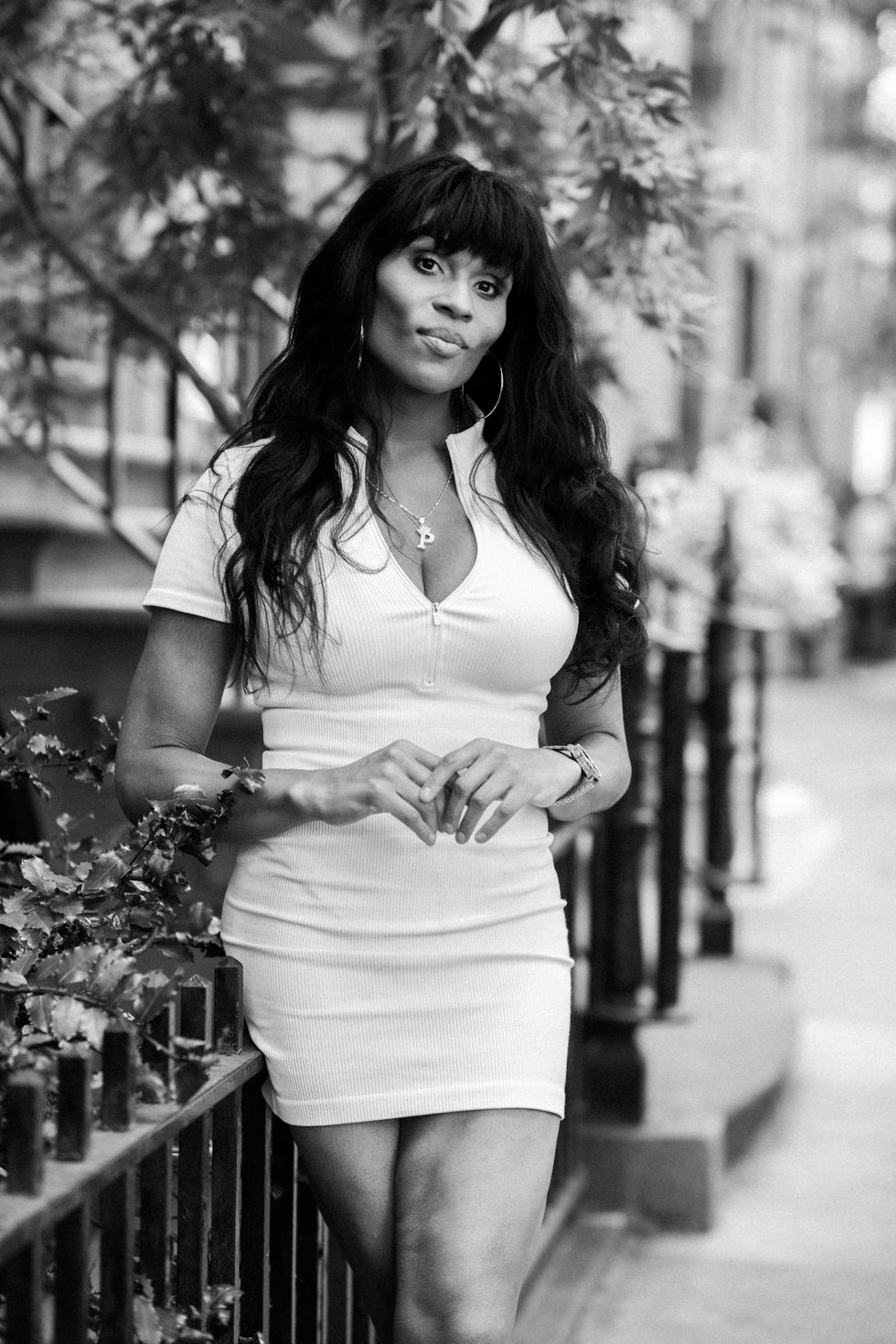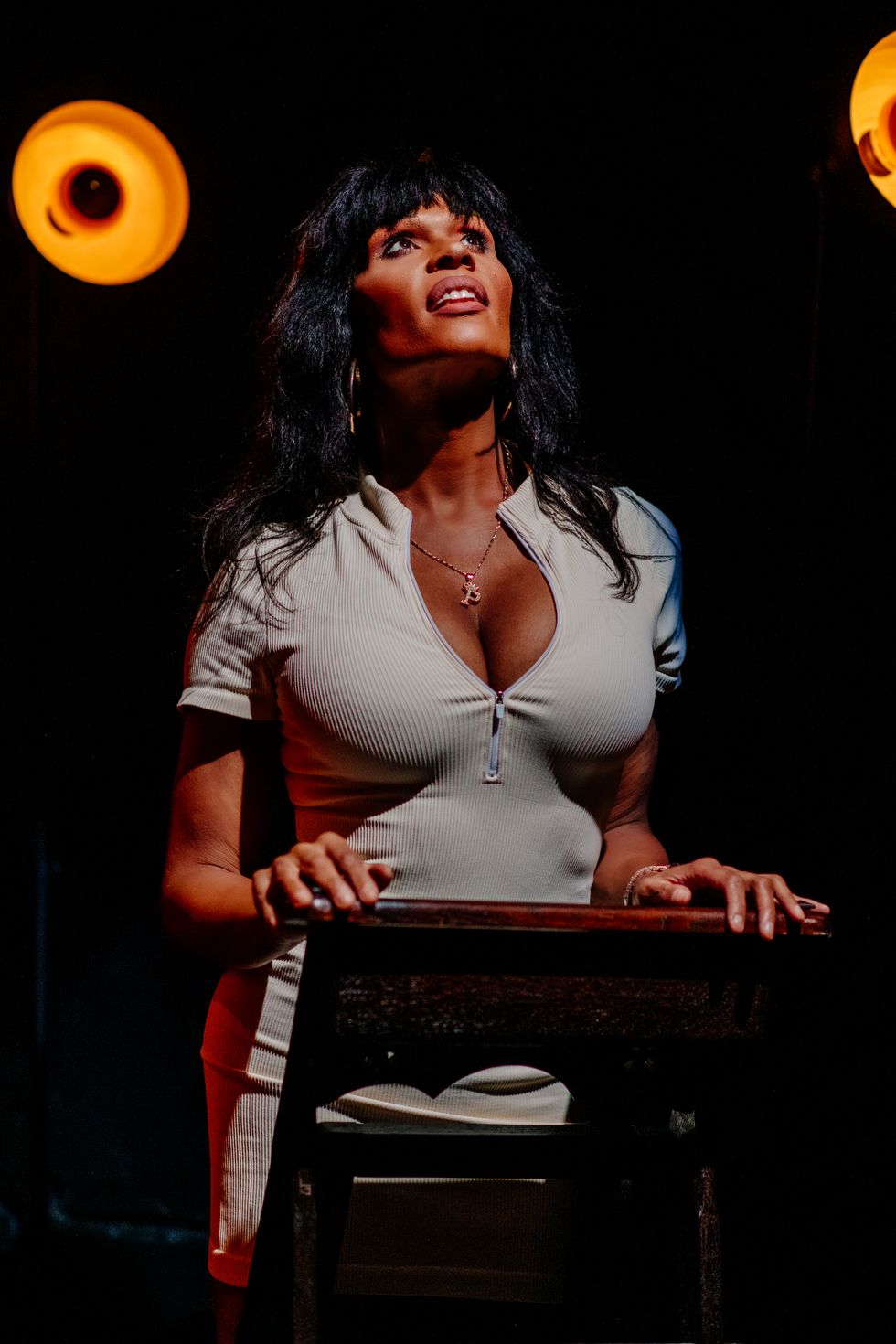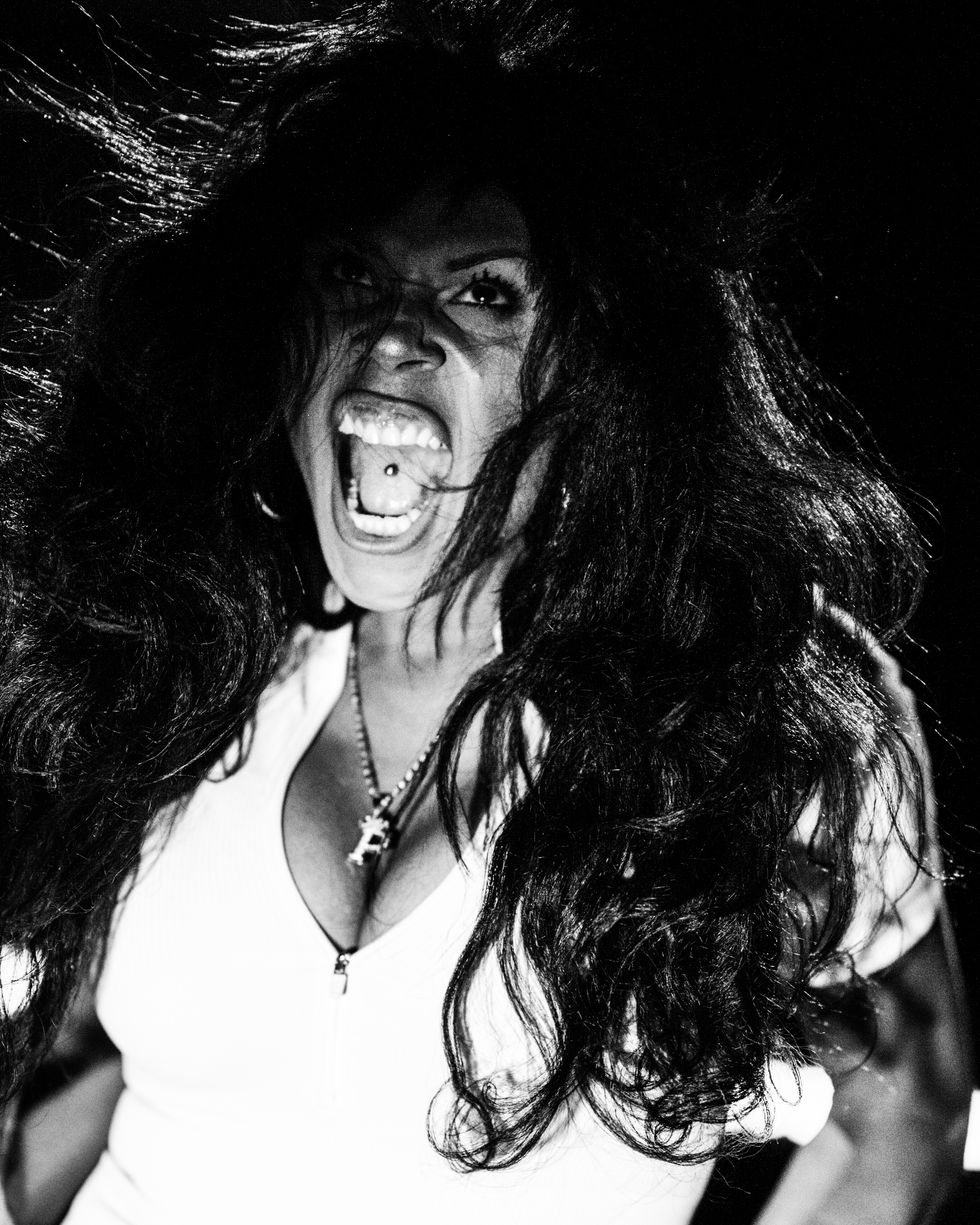
Peppermint Steps Into Cecilia Gentili's 'Red Ink'
Story by Adam Eli / Photography by Hunter Abrams
Aug 14, 2024
Cecilia Gentili has left behind an incalculable legacy. As a tireless activist across the queer, trans, sexual health, sex workers and immigrants rights movements, her impact is all around us. She also left behind an artistic legacy that includes the script, staging and team behind her one woman show Red Ink. The show is autobiographical, written in first person and about her search for god. Billed as “part stand-up, part camp and (almost) all true” the show was widely successful, with two sold-out runs.
This summer, the show’s original director, Nic Cory, and producer, George Struss, restaged Red Ink. Throughout August, the role of Cecilia is to be read by three famed trans performers, each with their own run of performances. This included Jes Tom (who just had his own extremely successful solo show), Angelica Ross of POSE and the iconic NYC drag queen Peppermint who made history in 2018 as the first out trans woman to originate a lead role on Broadway. Director Nic Cory explains that “Peppermint puts her own unique handprints on Cecilia’s words, which is really the point of producing Red Ink again: to give performers the opportunity to find their own way into Cecilia’s world.”
Ahead of her opening night, PAPER spoke to Peppermint about the show, her own faith and, of course, Cecilia.
In a previous article we worked on together. you said that Cecilia “set [you] on an irreversible and noble path thanks to her activism and spirit of protest." Can you tell me a bit more about that?
I first met Cecilia because she was my care counselor when I started my medical transition. She helped me with getting top surgery, filling out paperwork, providing me a list of doctors and getting organized in all things pertaining to my medical transition. She was also really good at helping me keep certain things in perspective. At the time I had friends but I didn’t have a lot of trans friends whose experiences I could pull from. I felt like I was going through this by myself and she was just a wonderful resource that I could reach out to whenever I needed to.
At the time I was comparing myself to all of these other girls and was in such a rush. It was especially inspiring and helpful when she told me that transitioning isn’t a race. There is no one way to be trans. You have to do it on your own time. It was so simple but it really resonated with me, allowing me to slow down and worry less.

I know that you and Cecilia worked together on POSE. Can you tell me a little bit about that and that experience?
She was such a wonderful performer. She really knew how to keep an audience captivated. Everyone on the set loved her and she stole the show. She was really a pro at comedic timing and physical comedy. I think her comedic abilities are really a testament to all of the things she experienced in her life. She found a way to channel everything she ever experienced into a phenomenal ability to connect with others and an audience.
Throughout the show, Cecilia grapples with God and her faith. She speaks with God, makes God promises and asserts often that she is an atheist. In what way has this role informed your faith, or lack thereof?
The show, the transcendent experience of being at Cecilia's funeral and all of the aftermath helped me realize something important. For a long time I was sent the message that I'm unholy because I'm queer. Hearing someone from the pulpit saying horrible things about you isn’t inviting to anybody. Growing up, I wanted to be far away from that energy.
But the service at St. Patrick's made me realize that maybe I was doing myself a disservice. Maybe I was doing the church a disservice.
There was that whole controversy about the Olympics opening ceremony and whether a bunch of queer folks were drawing reference to the Last Supper or a painting of the Greek Olympian gods. All that uproar wasn’t because these human beings were gathered around a table that might've looked like the Last Supper. It was about not wanting queer people to be seen in any religious context. Any time a queer person is feeling proud within the context of religion, then that is blasphemy. What they were trying to say is the mere existence of you in public is what is blasphemous and against God.
And that just isn’t true. Your existence isn’t against God. Church is not just for the straights. God is not only for the heteros. It's for all of us. The show makes it clear that Cecilia has a relationship with God. Nobody can quantify that or qualify it. Her connection with God has the same value as anybody else’s. And I love that through her passing, through her funeral service, and then of course through this show, she's showing us that.

Hopefully there will be more productions of Red Ink and more people will be stepping into the role of Cecilia. What advice would you give to someone who is performing Red Ink?
Nic, our fabulous director, gave me some wonderful advice. Right off the bat, he told me that we don't want you to imitate her, we don’t want you to embody her. This is about you, as a performer, telling a story. Use your own experience to tell the story and find a way to have that story resonate with the audience.
I also would say that if you are fortunate enough to carry the torch, then please do yourself a favor and learn as much as you can about Cecilia. She was obviously so multifaceted, and what she is best known for, her advocacy, doesn’t even really play a role in this piece. My advice is get to know her, read her book Faltas, watch her interviews and speeches. That will give a much more robust picture of who she was.
And above all else, play with it. See what different colors you can find in the text or in the physical performance. Cecilia, or at least the Cecilia I knew, seemed determined not to get hung up on anything. I think Cecilia would've been very happy for somebody to do this in a way that was very different from her. I think she’d be happy to see this brought to life as long as there's truth and authenticity in it. I think what she would have wanted most in a performer is someone who could find authenticity in the story for themselves and relay that to an audience.
Photography: Hunter Abrams
MORE ON PAPER
ATF Story
Madison Beer, Her Way
Photography by Davis Bates / Story by Alaska Riley
Photography by Davis Bates / Story by Alaska Riley
16 January
Entertainment
Cynthia Erivo in Full Bloom
Photography by David LaChapelle / Story by Joan Summers / Styling by Jason Bolden / Makeup by Joanna Simkim / Nails by Shea Osei
Photography by David LaChapelle / Story by Joan Summers / Styling by Jason Bolden / Makeup by Joanna Simkim / Nails by Shea Osei
01 December
Entertainment
Rami Malek Is Certifiably Unserious
Story by Joan Summers / Photography by Adam Powell
Story by Joan Summers / Photography by Adam Powell
14 November
Music
Janelle Monáe, HalloQueen
Story by Ivan Guzman / Photography by Pol Kurucz/ Styling by Alexandra Mandelkorn/ Hair by Nikki Nelms/ Makeup by Sasha Glasser/ Nails by Juan Alvear/ Set design by Krystall Schott
Story by Ivan Guzman / Photography by Pol Kurucz/ Styling by Alexandra Mandelkorn/ Hair by Nikki Nelms/ Makeup by Sasha Glasser/ Nails by Juan Alvear/ Set design by Krystall Schott
27 October
Music
You Don’t Move Cardi B
Story by Erica Campbell / Photography by Jora Frantzis / Styling by Kollin Carter/ Hair by Tokyo Stylez/ Makeup by Erika LaPearl/ Nails by Coca Nguyen/ Set design by Allegra Peyton
Story by Erica Campbell / Photography by Jora Frantzis / Styling by Kollin Carter/ Hair by Tokyo Stylez/ Makeup by Erika LaPearl/ Nails by Coca Nguyen/ Set design by Allegra Peyton
14 October




